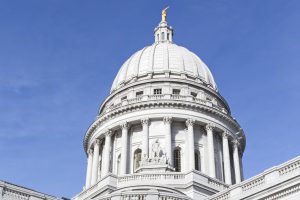 The subject of the impact of COVID-19 on school funding and on state finances affecting school funding was highlighted by two reports released this week.
The subject of the impact of COVID-19 on school funding and on state finances affecting school funding was highlighted by two reports released this week.
The first was a report by the Wisconsin Policy Forum entitled “Uncertainty Ahead: School Finances in the Face of COVID-19.” The report was covered by major media outlets throughout the state and will likely have an influence on the thinking of the public and lawmakers regarding the fiscal situation facing schools. The report also includes significant discussion of school fund balances. We suggest school leaders should review it.
The report starts by noting that: “School districts have seen their operations upended by COVID-19, with classroom teaching canceled and districts scrambling to move instruction online. Districts have larger reserves than in 2012, yet they face great challenges and uncertainty as they draft preliminary 2020-21 budgets. That uncertainty includes potential cuts in critical state aid, particularly if federal relief for state revenue losses is not forthcoming.”
The second report came in the form of a memo from the non-partisan Legislative Fiscal Bureau (LFB), with sobering news that state tax collections dropped significantly in April 2020 as compared with the previous April.
April is typically one of the highest months for state tax collections because of the April 15 tax income tax filing deadline. The report states:
“Tax collections in the month of April, 2020, were $1,145 million. This is $870 million below collections of April, 2019. And, for the 10 months of the current fiscal year, collections are $313 million below those over the same 10 months of 2018-19.
“The reduction in April, 2020, collections reflects two things. First, the coronavirus pandemic has severely impacted the state’s economy and tax collections. Second, the extension of income and franchise tax filing deadlines from April to July 15 in 2020 has affected collections. It is important to note, however, that income and franchise tax returns and estimated payments filed by July 15 will accrue to state fiscal year 2019-20 under the state’s budgetary cash and modified accrual method of accounting.”
As recently as late January, the LFB had estimated that the gross balance in the state’s general fund at the end of the current fiscal year on June 30, 2020, would be nearly $1.1 billion. That rosy forecast has largely gone out the window. This week’s report states:
“That balance will undoubtedly decrease because of reduced tax collections as shown in the April report and the upcoming May and June reports. The extent of the effect of that collection information will not be known until after the July 15 filing deadline for income and franchise taxes.”
However, amid the generally gloomy outlook, there were some causes for limited optimism in the report, at least in the short term. These include the following:
- A predicted $189 million transfer to the state’s budget stabilization (“rainy day”) fund identified in the January report is unlikely to occur. That money will remain in the general fund, boosting the 2019-20 ending balance.
- Last week, the state required certain state agency operations budgets to lapse 5% to the general fund in the 2019-20 fiscal year. That move will save an estimated $70 million, boosting the general fund ending balance by the same amount.
- The state’s budget stabilization (“rainy day”) fund will have an estimated balance of $655 million at the end of the 2019-20 fiscal year.
- The state will receive $2 billion from the federal government under the CARES Act. Although these funds must be used for expenditures made in response to the pandemic and cannot be used to replace state revenue shortfalls, discussions are underway in Washington on legislation to modify this restriction or to make additional federal funds available that could be used to “backfill” state revenue shortfalls.
